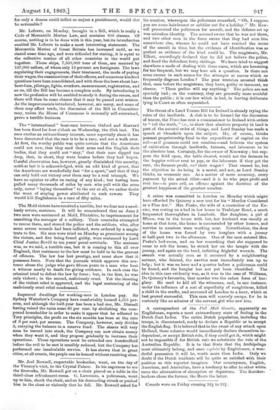Mr. Joel Rowsell, respectable bookseller, went, on the day of
the Viceroy's visit, to the Crystal Palace. In his eagerness to see the fireworks, Mr. Rowsell got on a chair placed on a table in the third-class refreshment-room. G. Lawrence, a policeman, went up to him, shook the chair, and on his descending struck or pushed him in the chest so violently that he fell. Mr. Rowsell asked for
his number, whereupon the policeman remarked, " Oh, I suppose you are some hairdresser or cobbler out for a holiday." Mr. Row- sell prosecuted the policeman for assault, and the defence set up was mistaken identity. The accused swore that he was not there, and two other men in the force swore that they had seen him somewhere else, whence he could not have reached the scene of the assault in time, but the evidence of identification was as perfect as evidence of the kind could be. The magistrate, Mr. Elliott, accordingly declared that he did not believe the police, and fined the defendant forty shillings. We have tried to suggest elsewhere a mode of dealing with these cases, which are becoming far too frequent, but we may here ask a question. Is there not some excuse in such scenes for the attempts at rescue which so frequently disgrace London ? The poor wretches arrested think that, once before the magistrate, they have, guilty or innocent, no chance. " Them perlice will say anything." The police are not specially bad ; on the contrary, they are generally more truthful than the public ; it is our law which is bad, in leaving deliberate lying in Court so often unpunished.






























 Previous page
Previous page